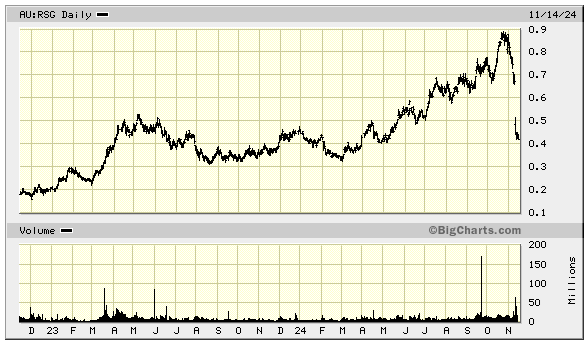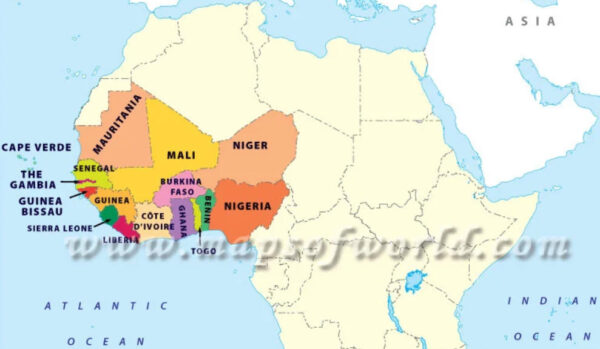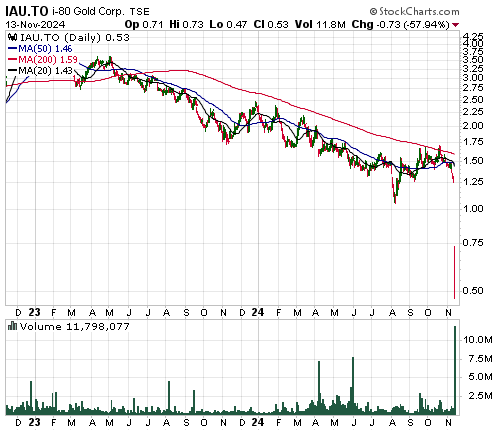November 20, 2024
[This blog post is an excerpt from a commentary published last week at www.speculative-investor.com]
Jurisdictional risk materialises with no warning
Jurisdictional risk is any additional risk that arises from doing business in a foreign country. The problem with this type of risk is that when it materialises, it does so without warning.
As exemplified by two recent events, jurisdictional risk for gold mining companies is relatively high among the countries of West Africa (the countries highlighted on the following map). The first of these events was a statement in early-October from the president of Burkina Faso that the government may withdraw existing permits for gold mines. This statement affected a number of Western gold mining companies, including TSI stock selection Fortuna Mining (FSM). FSM currently generates about 25% of its gold production in Burkina Faso.
The aforementioned statement by Burkina Faso’s president caused a 10% single-day plunge in the FSM stock price. The company put out a press release that soothed fears and the stock price quickly recovered, but the risk remains and could move back to centre-stage at any time.
The second of these events occurred early this week when Australia-listed Resolute Mining (RSG.AX), which is not a current TSI stock, advised that its CEO and two other employees had been detained by the government of Mali due to a disagreement over the government’s share of revenue from RSG’s Syama gold mine. In response to this news the RSG stock price immediately dropped by around 30% and, as illustrated by the following daily chart, is down by more than 50% from last month’s high. At the time of writing the employees are still being held hostage by the Mali government, which apparently is demanding a $160M payment.

In response to the RSG news, the stocks of some other gold mining companies with substantial exposure to Mali were hit hard. The hit to the B2Gold (BTG) stock price was relatively mild, however, even though the company’s most important currently-producing mine (Fekola) is located in Mali. We assume that this is because the company negotiated a new agreement with the Mali government only two months ago.

When nothing untoward happens in a country with high jurisdictional risk over a long period, investors tend to forget about the risk and the risk discount factored into the stock prices of companies operating in that country becomes small. As mentioned at the start of this discussion, the problem is that when this type of risk materialises, which it eventually almost always does, there is never any warning and therefore never time to get out prior to the price collapse. This is not a reason to avoid completely the stocks of companies operating in high-risk countries, but it is a reason to only buy such stocks when the risk discount is high and to manage the risk via appropriate position sizing and scaling out into strength.
Balance sheet risk materialises WITH warning
Unlike jurisdictional risk, balance sheet risk doesn’t suddenly appear out of nowhere. The signs of trouble are almost always obvious for a long period before the ‘crunch’. If management doesn’t take decisive action soon enough to recapitalise the company, there will no longer be an opportunity to recapitalise in a way that doesn’t destroy a huge amount of shareholder value. On Wednesday of this week the shareholders of i-80 Gold (IAU.TO) learned this lesson.
The IAU stock price was down 58% to a new all-time low on Wednesday 13th November in reaction to the company reporting its financial situation, operating results and a new development plan. In a nutshell, it was an acknowledgement that the company is under severe financial stress. However, this should not have come as a big surprise given that the company reported a working capital deficit of US$60M more than three months ago and has a loss-making business, meaning that the working capital deficit was bound to increase in the absence of new long-term financing.

A strong balance sheet is especially important for gold mining companies that either are in the mine construction phase or have commenced production but are not cash-flow positive. That’s because such companies need a sizable ‘cash/financing cushion’ to stay in business. For exploration-stage companies, having such a cushion is not as critical because these companies can survive by either temporarily stopping their exploration work or doing the occasional small equity financing.
The crux of the matter is that close attention should be paid to the balance sheet, which forms part of the information that public companies issue on a quarterly basis.
